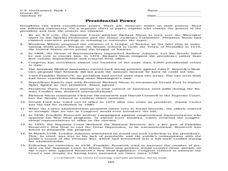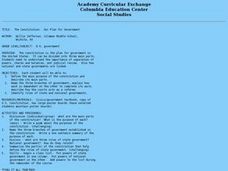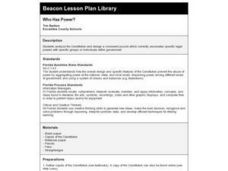Curated OER
Introduction to the History of the Michigan Supreme Court
Pupils identify the players, events and changes in the history of the Supreme Court of Michigan. They explain the purpose of the Court in state government. They summarize the role and purpose of the Court.
Curated OER
Brown v. Board of Education of Topeka
Twelfth graders explore desegregation as it occurred at various stages in United States history. They specifically chronicle the role of South Carolina in the desegregation case of Brown v. Board of Education.
Curated OER
Supreme Court Newspaper
Young scholars examine the purpose and responsibilities of the Supreme Court and its justices. In groups, they research a specific case and identify how the Supreme Court affects their lives. Using the information they find, they...
Curated OER
What Do You Know? Supreme Court Nominations
Students discuss what they believe Supreme Court Justices should do while in office. As a class, they brainstorm a list of their prior knowledge about the justices and Supreme Court. In their journal, they write about the qualities of...
Curated OER
John G. Roberts, Jr. -- Nominee, Chief Justice of the U.S. Supreme Court
Students examine the life and work of John G. Roberts, the nominee to be the Chief Justice of the Supreme Court. In groups, they use the internet to define the role of the Chief Justice and complete handouts to record their information....
Curated OER
Ethnicity, Gender and the Courts
Eleventh graders explore their own beliefs about the qualities that make someone qualified to sit on the Supreme Court. In this American Government lesson, 11th graders write about and debate the ethnic, religious, and gender makeup of...
Curated OER
Checks on Presidential Power
Students examine presidential powers. In this checks and balances lesson, students identify the constitutional and informal restraints of the president and consider the reasons for the limitations.
Curated OER
The Plan of Government under the U.S. Constitution
Students explore the U.S. plan for federal government. In this U.S. Constitution activity, students investigate a chart on the responsibilities of the Executive, Judicial, and Legislative Branches of governments. Students complete a...
Curated OER
Checks and Balances
Students take a closer look at the responsibilities of the Legislative, Judicial, and Executive branches. In this U.S. government lesson plan, students read articles 1, 2, and 3 of the Constitution and then use Venn diagrams to compare...
Curated OER
Houghton Mifflin Social Studies/Chapter 13, Lesson 2 California Fights Smog (pp. 296-300)
Third graders look into certain environmental problems. The governmental branches are investigated and how government takes care to solve problems of the environment.
Curated OER
Government
Eighth graders analyze the purposes of government. They examine or assess the importance of citizenship to the individual or to society at large (e.g., the importance of voting). Students explain the structure and functions of the three...
Curated OER
Civics: State Vs. Rowe
Students examine the case of State vs. Rowe to discover the duties of the three branches of government. They explore the concepts of separation of powers and checks and balances to assess how they apply to an actual situation.
Curated OER
US Constitution And Amendments
Pupils become familiar with the US Constitution and consider how it affects their lives. They research the Preamble to articulate the purposes of government, compile collages, and research the separation of powers within each branch of...
Curated OER
Presidential Powers
In this Presidential Powers activity, students answer five questions about the various powers of the president by writing short responses.
Curated OER
The Constitution: Our Plan for Government
Students investigate the importance of separation of powers, checks, balances, and judicial review. They also investigate how national and state governments are linked.
Curated OER
Who Has Power?
Fourth graders discuss abuse of power in government and examine the Constitution for specific powers in each branch. They create a crossword puzzle utilizing terms and information regarding division of government powers and federalism
Curated OER
Citizens of the Future
Young sociologists explore how local, state, and federal governments work. This very impressive and ambitious lesson requires pupils to contact government officials who represent them and their families. They research elections, and hold...
Curated OER
Teaching With Documents: U.S. Constitution Workshop
What does it mean to be American? Explore the constitution and what it really means to be a citizen here. First, learners of all ages will investigate different primary source documents. Then, they establish each document's...
Curated OER
What is Due Process Anyway?
Students examine the term due process and its historical origins. They compare and constrast the requirements of due process in the United States Constitution and the Indiana Constitution. They also discuss the difference between...
Curated OER
What's the Difference Between Procedural and Substantive Due Process?
Students discuss the difference between substantive and procedural due process. They research the uses of due process on the internet and books. They also discuss cases involving students and due process.
Curated OER
The Changing Meaning of "Due Process"
Students examine the United States Constitution and how the application for due process differs in two amendments. They research the changing definition of the term since the Civil War. They use the internet to research press coverage of...
Curated OER
The American Revolution: 1775 - 1783
Track the ins and outs and wartime strategies used by both the British and the Americans during the Revolutionary War. Multiple comparisons are made between both factions, maps, statistical data, images, and light text is used throughout...
Curated OER
United States Government 5th Grade
In this review of United States government activity, 5th graders recall facts and answer multiple choice questions. Students answer 25 questions.
Curated OER
Statehouse Time Capsule
Fourth graders create a time capsule that is representative of their community. They explain why the chosen objects are representative of themselves or their community.

























